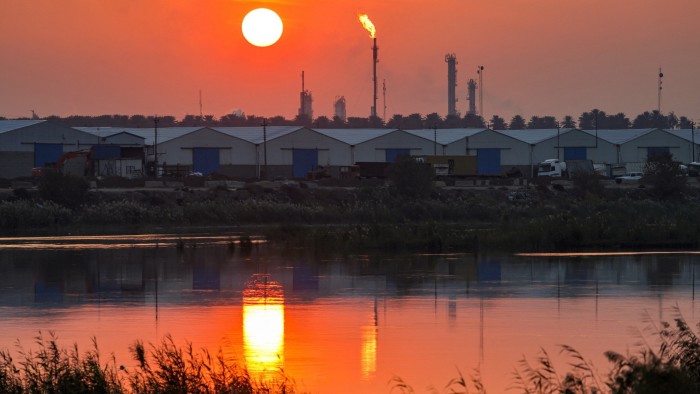Stay informed with free updates
Simply sign up to the Oil myFT Digest — delivered directly to your inbox.
Israel’s strikes against Iran have threatened to ignite a regional conflict that disrupts oil supplies across the Middle East, with traders reviving the decades-old question of whether Tehran could respond by closing the vital industry chokepoint at the Strait of Hormuz.
Brent crude, the global benchmark, surged 12 per cent to a high of $78.5 per barrel in the early hours of Friday morning after Israel launched dozens of strikes against Iran’s nuclear programme and military facilities, killing at least two top commanders.
Prices fell back to $75 a barrel as it became clear that Israel had stopped short of targeting Iran’s oil infrastructure, but traders said prices could move significantly higher depending on how Tehran retaliates.
“The market is reasonably calm because the Israelis chose not to target oil infrastructure, but if you’re Iran, you know that’s the Achilles heel,” said a senior executive at a major oil trading company, pointing to the risk that Tehran responds by attacking oil facilities in the Gulf or tankers in the Strait of Hormuz.
About 21mn barrels of oil from Iran, Iraq, Kuwait, Saudi Arabia and the United Arab Emirates pass daily through the narrow waterway separating the Islamic republic from the Gulf states, representing about a third of the world’s seaborne oil supplies. Iran has repeatedly threatened to close the strait in the event of an attack but has never been able to block all traffic.
“It is our understanding that it would be extremely difficult for Iran to close the strait for an extended period given the presence of the US Fifth Fleet in Bahrain,” Helima Croft, head of global commodity strategy at RBC Capital Markets, said in a note.
Tehran could launch attacks on tankers to disrupt traffic, as it did during the Iran-Iraq war in the 1980s, she said. However, such a step would also disrupt the more than 1mn b/d that Iran exports to China.
When Iran and Israel exchanged air strikes in April and October 2024, it was Iran that struck first with Israel retaliating.
“This time, the sequence has reversed — a shift that could significantly influence market expectations and risk perceptions,” said Jorge León, head of geopolitical analysis at energy consultancy Rystad. If Iran disrupts oil flows through the Strait of Hormuz, targets regional oil infrastructure or strikes US military assets, it could push prices up by “$20 per barrel or more”, he said.
Equally, Israel could escalate its assault by targeting Iran’s vital Kharg Island terminals, which are responsible for 90 per cent of the Islamic republic’s oil exports and the primary source of funds for its government and nuclear programme.
Traders said prices, which remain below levels earlier in the year before US President Donald Trump launched his blitz of global tariffs, would be much higher if markets became convinced that direct attacks on oil infrastructure were likely.
“The correct price for oil is almost certainly not where it is today,” the senior trading executive said. “The fundamentals [of supply and demand] tell you the price should be lower by $10 or more. The risk premium, if you need a risk premium, probably should be $10 higher.”
Read the full article here




